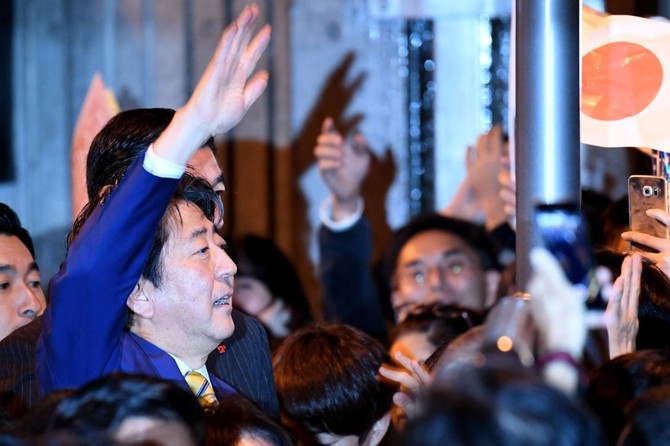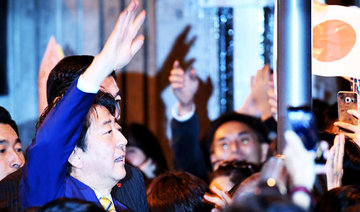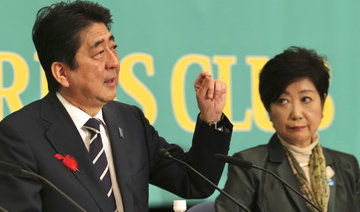TOKYO: Japanese Prime Minister Shinzo Abe swept to a comfortable victory in a snap election Sunday, handing him a mandate to harden his already hawkish stance on North Korea and re-energize the world’s number-three economy.
Abe’s conservative coalition was on track to win 311 seats in the 465-seat parliament, according to a projection published by private broadcaster TBS, putting the nationalist blue blood on course to become Japan’s longest-serving leader.
The comfortable election win is likely to stiffen Abe’s resolve to tackle North Korea’s nuclear menace, as the key US regional ally seeks to exert maximum pressure on the regime in Pyongyang after it fired two missiles over Japan in the space of a month.
Millions of Japanese braved torrential rain and driving winds to vote, as a typhoon bears down on the country with many heeding warnings to cast their ballots early.
“I support Abe’s stance not to give in to North Korea’s pressure,” said one voter, Yoshihisa Iemori, as he cast his ballot in rain-swept Tokyo.
Abe’s Liberal Democratic Party (LDP) benefitted from a weak and splintered opposition, with the two main parties facing him created only a matter of weeks ago.
Support for the Party of Hope founded by popular Tokyo Governor Yuriko Koike fizzled after an initial blaze of publicity and was on track to win around 50 seats, the TBS projection suggested.
A new center-left Constitutional Democratic Party fared slightly better than expected but was still far behind Abe.
“The LDP’s victory is simply because the opposition couldn’t form a united front,” political scientist Mikitaka Masuyama from the National Graduate Institute for Policy Studies, said.
The short 12-day campaign was dominated by the economy and the global crisis over North Korea, which has threatened to “sink” Japan into the sea.
Nationalist Abe stuck to a hard-line stance throughout, stressing that Japan “would not waver” in the face of an increasingly belligerent regime in Pyongyang.
Despite the saber-rattling from North Korea, many voters said reviving the once-mighty Japanese economy was the top priority, with Abe’s trademark “Abenomics” policy failing to trickle down to the general public.
The three-pronged combination of ultra-loose monetary policy, huge government spending and structural reform has catapulted the stock market to a 21-year high but failed to stoke inflation and growth has remained sluggish.
“Neither pensions nor wages are getting better ... I don’t feel the economy is recovering at all,” said 67-year-old pensioner Hideki Kawasaki.
Although voters turned out in their millions to back Abe, support for the 63-year-old is lukewarm and surveys showed his decision to call a snap election a year earlier than expected was unpopular.
Voter Etsuko Nakajima, 84, said: “I totally oppose the current government. Morals collapsed. I’m afraid this country will be broken.”
“I think if the LDP takes power, Japan will be in danger. He does not do politics for the people,” added the pensioner.
Koike briefly promised to shake up Japan’s sleepy political scene with her new party but she declined to run herself for a seat, sparking confusion over who would be prime minister if she won.
In the end, the 65-year-old former TV presenter was not even in Japan on election day, preferring an official engagement in Paris as head of the world’s biggest city.
“I thought that I would vote for the Party of Hope if it’s strong enough to beat the Abe administration. But the party has been in confusion ... I’m quite disappointed,” said 80-year-old pensioner Kumiko Fujimori.
The 12-day campaign was marked by a near-constant drizzle in large parts of the country and rallies frequently took place under shelter and a sea of umbrellas.
But this did not dampen the enthusiasm of hundreds of doughty, sash-wearing parliamentary hopefuls, who have driven around in minibuses pleading for votes via loudspeaker and bowing deeply to every potential voter.


Abe sweeps to big win in Japan vote
Abe sweeps to big win in Japan vote

Court records raise doubts that ICE is detaining the ‘worst of the worst’ in Maine

- Federal officials say more than 100 people have been detained statewide enforcement ‘Operation Catch of the Day’
- ICE has said the operation is targeting about 1,400 immigrants in a state of about 1.4 million people
PORTLAND, Maine: Immigration and Customs Enforcement has highlighted the detention of people whom it called some of Maine’s most dangerous criminals during operations this past week, but court records paint a more complicated picture.
Federal officials say more than 100 people have been detained statewide in what ICE dubbed “Operation Catch of the Day,” a reference to the fishing industry. ICE said in a statement that it was arresting the “worst of the worst,” including “child abusers and hostage takers.”
Court records show some were violent felons. But they also show other detainees with unresolved immigration proceedings or who were arrested but never convicted of a crime.
Immigration attorneys and local officials say similar concerns have surfaced in other cities where ICE has conducted enforcement surges and many of those targeted lacked criminal records.
One case highlighted by ICE that involves serious felony offenses and criminal convictions is that of Sudan native Dominic Ali. ICE said Ali was convicted of false imprisonment, aggravated assault, assault, obstructing justice and violating a protective order.
Court records show Ali was convicted in 2004 of violating a protective order and in 2008 of second-degree assault, false imprisonment and obstructing the reporting of a crime. In the latter case, prosecutors said he threw his girlfriend to the floor of her New Hampshire apartment, kicked her and broke her collarbone.
“His conduct amounted to nothing less than torture,” Judge James Barry said in 2009 before sentencing Ali to five to 10 years in prison.
Ali was later paroled to ICE custody, and in 2013 an immigration judge ordered his removal. No further information was available from the Executive Office for Immigration Review, and it remains unclear what happened after that order.
Other cases were more nuanced, like that of Elmara Correia, an Angola native whom ICE highlighted in its public promotion of the operation, saying she was “arrested previously for endangering the welfare of a child.”
Maine court records show someone with that name was charged in 2023 with violating a law related to learner’s permits for new drivers, a case that was later dismissed.
Correia filed a petition Wednesday challenging her detention, and a judge issued a temporary emergency order barring authorities from transferring her from Massachusetts, where she is being held. Her attorney said she entered the United States legally on a student visa about eight years ago and has never been subject to expedited removal proceedings.
“Was she found not guilty, or are we just going to be satisfied that she was arrested?” Portland Mayor Mark Dion said during a news conference in which he raised concerns that ICE failed to distinguish between arrests and convictions or explain whether sentences were served.
Dion also pointed to another person named in the release: Dany Lopez-Cortez, whom ICE said is a “criminal illegal alien” from Guatemala who was convicted of operating under the influence.
ICE highlighted Lopez-Cortez’s case among a small group of examples it said reflected the types of arrests made during the operation. Dion questioned whether an operating-under-the-influence conviction, a serious offense but one commonly seen in Maine, should rise to the level of ICE’s “worst of the worst” public narrative.
Boston immigration attorney Caitlyn Burgess said her office filed habeas petitions Thursday on behalf of four clients who were detained in Maine and transferred to Massachusetts.
The most serious charge any of them faced was driving without a license, Burgess said, and all had pending immigration court cases or applications.
“Habeas petitions are often the only tool available to stop rapid transfers that sever access to counsel and disrupt pending immigration proceedings,” she said.
Attorney Samantha McHugh said she filed five habeas petitions on behalf of Maine detainees Thursday and expected to file three more soon.
“None of these individuals have any criminal record,” said McHugh, who is representing a total of eight detainees. “They were simply at work, eating lunch, when unmarked vehicles arrived and immigration agents trespassed on private property to detain them.”
Federal court records show that immigration cases involving criminal convictions can remain unresolved or be revisited years later.
Another whose mug shot was included in materials on “the worst of the worst” of those detained in Maine is Ambessa Berhe.
Berhe was convicted of cocaine possession and assaulting a police officer in 1996 and cocaine possession in 2003.
In 2006 a federal appeals court in Boston vacated a removal order for him and sent the case back to the Board of Immigration Appeals for further consideration.
According to the ruling, Berhe was born in Ethiopia and later taken to Sudan by his adoptive parents. The family was admitted to the United States as refugees in 1987, when he was about 9.
ICE has said the operation is targeting about 1,400 immigrants in a state of about 1.4 million people, roughly four percent of whom are foreign-born.
Federal officials say more than 100 people have been detained statewide in what ICE dubbed “Operation Catch of the Day,” a reference to the fishing industry. ICE said in a statement that it was arresting the “worst of the worst,” including “child abusers and hostage takers.”
Court records show some were violent felons. But they also show other detainees with unresolved immigration proceedings or who were arrested but never convicted of a crime.
Immigration attorneys and local officials say similar concerns have surfaced in other cities where ICE has conducted enforcement surges and many of those targeted lacked criminal records.
One case highlighted by ICE that involves serious felony offenses and criminal convictions is that of Sudan native Dominic Ali. ICE said Ali was convicted of false imprisonment, aggravated assault, assault, obstructing justice and violating a protective order.
Court records show Ali was convicted in 2004 of violating a protective order and in 2008 of second-degree assault, false imprisonment and obstructing the reporting of a crime. In the latter case, prosecutors said he threw his girlfriend to the floor of her New Hampshire apartment, kicked her and broke her collarbone.
“His conduct amounted to nothing less than torture,” Judge James Barry said in 2009 before sentencing Ali to five to 10 years in prison.
Ali was later paroled to ICE custody, and in 2013 an immigration judge ordered his removal. No further information was available from the Executive Office for Immigration Review, and it remains unclear what happened after that order.
Other cases were more nuanced, like that of Elmara Correia, an Angola native whom ICE highlighted in its public promotion of the operation, saying she was “arrested previously for endangering the welfare of a child.”
Maine court records show someone with that name was charged in 2023 with violating a law related to learner’s permits for new drivers, a case that was later dismissed.
Correia filed a petition Wednesday challenging her detention, and a judge issued a temporary emergency order barring authorities from transferring her from Massachusetts, where she is being held. Her attorney said she entered the United States legally on a student visa about eight years ago and has never been subject to expedited removal proceedings.
“Was she found not guilty, or are we just going to be satisfied that she was arrested?” Portland Mayor Mark Dion said during a news conference in which he raised concerns that ICE failed to distinguish between arrests and convictions or explain whether sentences were served.
Dion also pointed to another person named in the release: Dany Lopez-Cortez, whom ICE said is a “criminal illegal alien” from Guatemala who was convicted of operating under the influence.
ICE highlighted Lopez-Cortez’s case among a small group of examples it said reflected the types of arrests made during the operation. Dion questioned whether an operating-under-the-influence conviction, a serious offense but one commonly seen in Maine, should rise to the level of ICE’s “worst of the worst” public narrative.
Boston immigration attorney Caitlyn Burgess said her office filed habeas petitions Thursday on behalf of four clients who were detained in Maine and transferred to Massachusetts.
The most serious charge any of them faced was driving without a license, Burgess said, and all had pending immigration court cases or applications.
“Habeas petitions are often the only tool available to stop rapid transfers that sever access to counsel and disrupt pending immigration proceedings,” she said.
Attorney Samantha McHugh said she filed five habeas petitions on behalf of Maine detainees Thursday and expected to file three more soon.
“None of these individuals have any criminal record,” said McHugh, who is representing a total of eight detainees. “They were simply at work, eating lunch, when unmarked vehicles arrived and immigration agents trespassed on private property to detain them.”
Federal court records show that immigration cases involving criminal convictions can remain unresolved or be revisited years later.
Another whose mug shot was included in materials on “the worst of the worst” of those detained in Maine is Ambessa Berhe.
Berhe was convicted of cocaine possession and assaulting a police officer in 1996 and cocaine possession in 2003.
In 2006 a federal appeals court in Boston vacated a removal order for him and sent the case back to the Board of Immigration Appeals for further consideration.
According to the ruling, Berhe was born in Ethiopia and later taken to Sudan by his adoptive parents. The family was admitted to the United States as refugees in 1987, when he was about 9.
ICE has said the operation is targeting about 1,400 immigrants in a state of about 1.4 million people, roughly four percent of whom are foreign-born.
© 2026 SAUDI RESEARCH & PUBLISHING COMPANY, All Rights Reserved And subject to Terms of Use Agreement.












